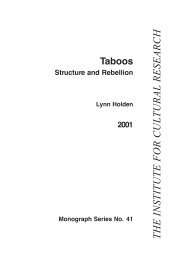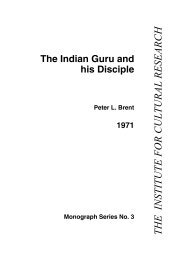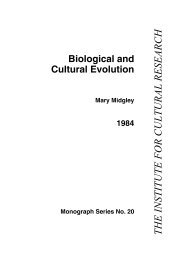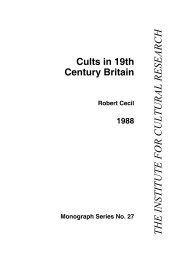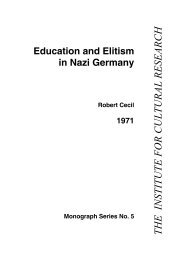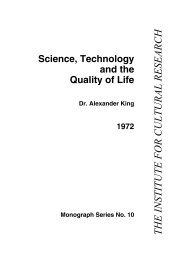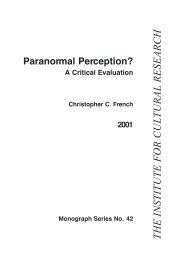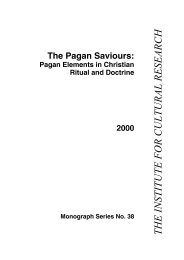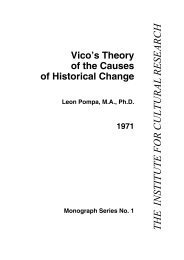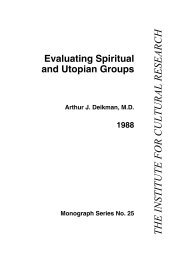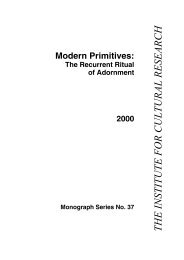Cultural Identity: Solution or Problem - The Institute For Cultural ...
Cultural Identity: Solution or Problem - The Institute For Cultural ...
Cultural Identity: Solution or Problem - The Institute For Cultural ...
You also want an ePaper? Increase the reach of your titles
YUMPU automatically turns print PDFs into web optimized ePapers that Google loves.
esearch on these matters and affect the way people think about and<br />
practise sex and marriage. F<strong>or</strong> anthropology, the reflexivity effect<br />
used to be less marked, since many of the people anthropologists<br />
studied were illiterate and anthropologists published their results in<br />
their home countries and in their own languages. But with increasing<br />
education and globalisation, the people the anthropologists study are<br />
now often able to read what is written about them.<br />
In sum, then, social scientists helped to institutionalise a concept<br />
of ‘culture’ as a thing, with an essence and often an essential<br />
hist<strong>or</strong>y, a thing which can be owned, and theref<strong>or</strong>e stolen and lost.<br />
Even though they no longer use such a concept of culture and spend<br />
a good part of their time criticising it, it has become a maj<strong>or</strong> aspect<br />
of modern society.<br />
What are the problems involved in these essentialist views of<br />
culture? <strong>The</strong>y are, of course, the s<strong>or</strong>t of problems I outlined earlier.<br />
Take the example of Afrocentrism which has a certain currency<br />
among blacks in the USA (and elsewhere). 12 Afrocentrism focuses on<br />
the African <strong>or</strong>igins of African Americans and tries to re-evaluate<br />
African culture, giving it a positive w<strong>or</strong>th, perhaps gl<strong>or</strong>ifying Africa<br />
as the source of all civilisation, construing Egypt as ‘African’ and as<br />
the source of Western civilisation itself. Afrocentrism invites black<br />
people all over the Americas and throughout the African diasp<strong>or</strong>a to<br />
come together around a common notion of themselves as African and<br />
thus sharing certain basic attributes. Now this s<strong>or</strong>t of philosophy can<br />
be very useful in inculcating a certain pride and discipline in, say,<br />
black urban communities in the USA. But it also has problems which<br />
stem from its essentialism. It claims to define African American<br />
culture in terms of a central c<strong>or</strong>e of African tradition and culture and<br />
to talk about African American hist<strong>or</strong>y in terms of the thread which<br />
links American blacks to Africa. In so doing, it tends to reproduce the<br />
process of stereotyping (of blacks as ‘uncultured’, as ‘inferi<strong>or</strong>’, etc.)<br />
which it is seeking to criticise. It may invert the stereotypes, but it is<br />
still dealing in the same currency. Some Afrocentric activists and<br />
the<strong>or</strong>ists talk about ‘ice cultures’ (N<strong>or</strong>thern European ones) and ‘sun<br />
cultures’ (African ones) in which ‘ice’ is bad, cold, unemotional,<br />
repressed, domineering and exploitative, while ‘sun’ is good, warm,<br />
friendly, empathetic and egalitarian. This actually reproduces very<br />
stereotyped views of Africans and Europeans, although it places the<br />
f<strong>or</strong>mer at the top of the ladder instead of the bottom. In some cases,<br />
15



